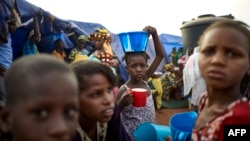The United States is working with the Sahel region of Africa - an ecological belt that stretches from the Atlantic coast of Senegal in the west to the shores of the Red Sea in Sudan. It also often refers to five West African states comprising the so-called “G5-Sahel,” including Burkina Faso, Chad, Mali, Mauritania, and Niger.
“We are here to work with you to help bring security, stability, and good governance to the people of the Sahel,” said Under Secretary of State for Political Affairs David Hale in remarks to the International Coalition for the Sahel Ministerial.
Instability has grown in the Sahel despite the coalition’s collaboration to disrupt terrorist networks. The number of people displaced in the central Sahel is now eleven times greater than it was two years ago. The number of people facing acute hunger has tripled over the past year.
With these dire conditions in view, Under Secretary Hale announced more than $80 million in additional humanitarian assistance for the region. “As we work to alleviate suffering, we recommit to supporting our African partners in their work to address not just the suffering, but the drivers of conflict,” he said.
Rural populations need access to basic services in the short term and mechanisms to encourage economic opportunity and resolve disputes in the long term. These can help counter the appeal of terrorist group recruitment and prevent inter-communal conflict.
Moreover, marginalized groups and people throughout the region – especially those who are far from national seats of power – need to have a voice in how they are governed.
Governments must also protect their people. When security forces violate and abuse human rights, governments must hold those responsible to account.
Mali’s stability is critical to the wider region, noted Under Secretary Hale: “We laud the transitional government’s commitment to long-needed governance, anti-corruption, and security reforms. However, we believe that the implementation of those reforms should begin now and be handed over to a democratically elected, representative government by the April 2022 timeline, as the transitional government has agreed.”
Democracies have proven to be more stable, open, committed to human rights, conducive to economic growth, and less prone to conflict than undemocratic forms of governance
“We look forward to continuing our work with our African and European partners,” said Under Secretary Hale, “to help create a more prosperous and stable Sahel region."














